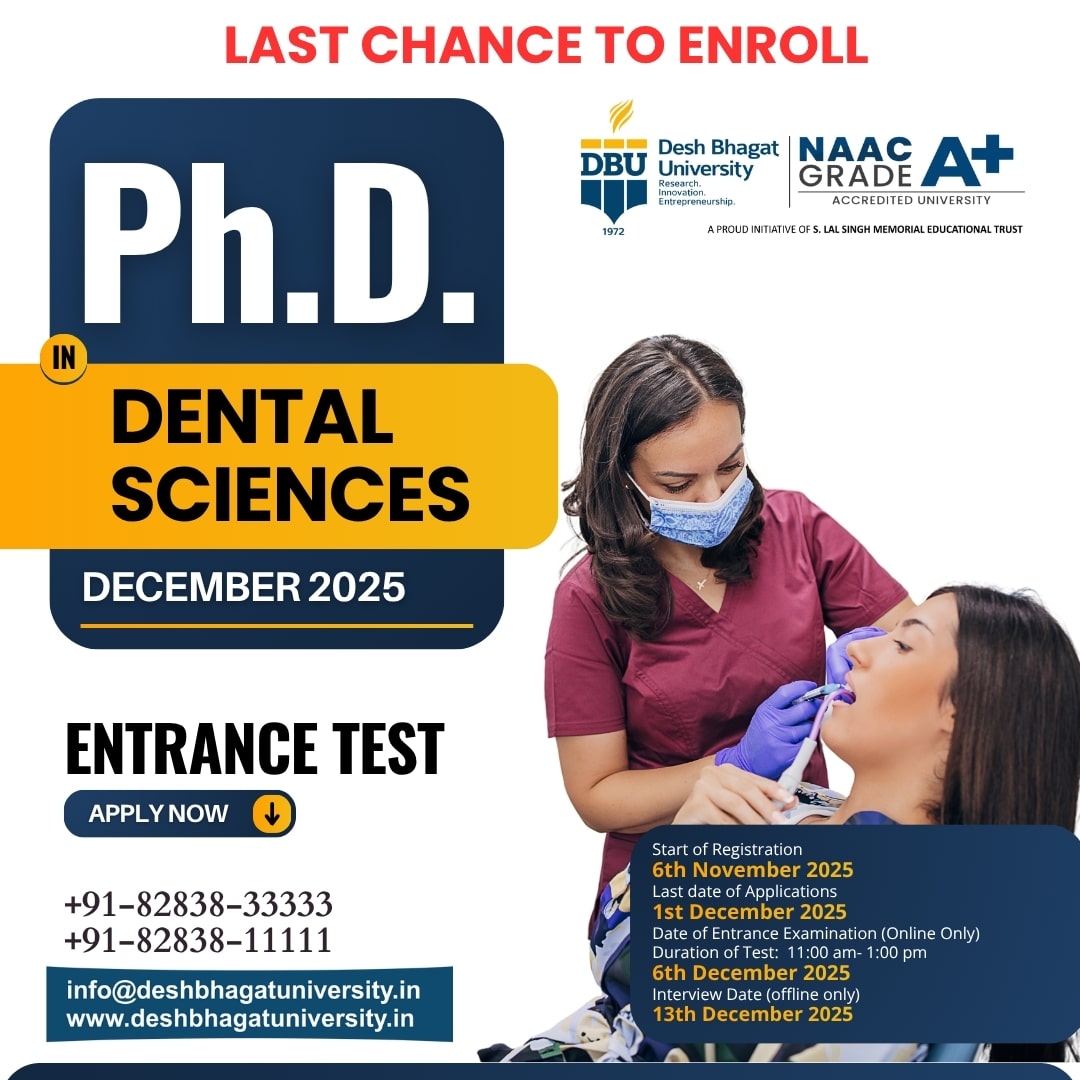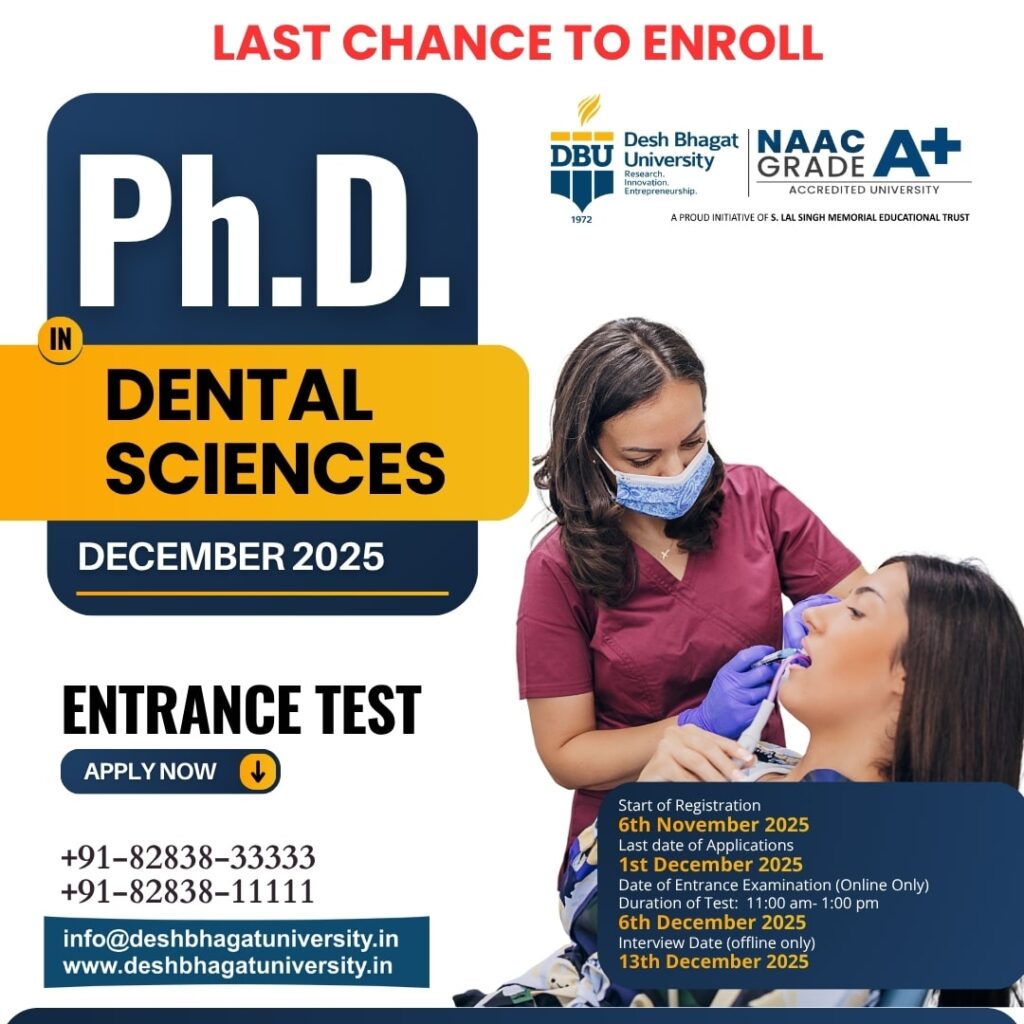PhD in Dental Sciences in India: Career, Admission 2026
July 15, 2025 2025-11-06 8:12PhD in Dental Sciences in India: Career, Admission 2026

PhD in Dental Sciences in India: Career, Admission 2026
A Ph.D. in Dental Sciences is a higher-level study program that focuses on researching different areas of dentistry and the health of teeth and gums. This degree is for individuals who want to contribute original research in areas like dental materials, orthodontics, periodontology, public health dentistry, and more. Desh Bhagat University (DBU) in Mandi Gobindgarh, Punjab, offers a well-structured Ph.D. program in Dental Sciences designed to equip students with the necessary skills to become experts in their field.
In this article, we will cover everything you need to know about pursuing a Ph.D. in Dental Sciences at DBU. This includes eligibility criteria, the admission process, available research areas, the duration of the program, career opportunities, and salary expectations.
What is a Ph.D. in Dental Sciences?
A Ph.D. in Dental Sciences is a research-based program designed for individuals who already have a strong background in dentistry. The program allows students to conduct original research in a specialized area of dental sciences. The goal is to advance knowledge and improve practices in dental care, oral health, and related fields.
Throughout the program, students are encouraged to explore new techniques, develop innovative materials, and find solutions to the challenges faced by dental professionals and patients. A Ph.D. in Dental Sciences not only provides an opportunity to contribute to scientific advancements but also opens doors to teaching and leadership roles in academia, healthcare, and the dental industry.
Eligibility Criteria for Ph.D. in Dental Sciences at DBU
Before applying for a Ph.D. in Dental Sciences at DBU, it’s important to meet the eligibility requirements. Here are the main qualifications needed to apply for the program:
1. Educational Qualifications
- Master’s Degree in Dental Sciences (MDS): Candidates should have a Master’s degree in Dental Sciences or a related field (e.g., MDS in Orthodontics, Periodontology, etc.) from a recognized university.
- Minimum Marks Requirement: You must have scored at least 55% in your MDS degree (50% for SC/ST/OBC candidates).
2. National-Level Examinations
- UGC-NET/CSIR-NET/GATE: If you have qualified for any national-level examination like UGC-NET, CSIR-NET, or GATE, you are exempt from the university’s entrance examination. These exams assess a candidate’s understanding of research methodologies and core subjects.
3. Direct Admission after Bachelor’s Degree
- Bachelor of Dental Surgery (BDS): Candidates with a BDS degree and a strong academic record (minimum of 75%) may also be eligible to apply directly for the Ph.D. program. However, they must clear the National Eligibility Test (NET) for Ph.D. admissions.
The Admission Process for Ph.D. in Dental Sciences at DBU
The Ph.D. admission process at DBU is divided into two main stages: the entrance examination and the interview. Below is a breakdown of the entire process:
1. Stage I: Entrance Examination
The entrance exam for the Ph.D. in Dental Sciences assesses the following areas:
- Research Methodology (30 marks): This section evaluates your understanding of research methods, data collection, and analysis techniques.
- Functional English (15 marks): This section tests your ability to communicate effectively in English, which is important for publishing research and presenting findings.
- Functional Knowledge of Computers (15 marks): As research in dental sciences involves data analysis and simulations, this section checks your proficiency in computer usage.
- Core Dental Sciences (40 marks): The final section tests your knowledge of dental sciences, including oral biology, orthodontics, periodontology, and other key areas of dentistry.
The entrance exam is online, and there is no negative marking. This allows candidates to attempt all questions without the fear of losing marks for incorrect answers.
2. Stage II: Interview
Once you qualify in the entrance exam, the next stage is the interview. In the interview, candidates will be asked to:
- Present their proposed research ideas and demonstrate how they plan to contribute to the field of dental sciences.
- Discuss their previous academic work and how it aligns with their proposed research.
- Evaluate the feasibility of their research and its potential impact on dental practices or public health.
The final selection is based on the combined performance in the entrance examination and interview.
Duration of Ph.D. in Dental Sciences at DBU
The Ph.D. program in Dental Sciences at DBU has a flexible duration, allowing students to complete the program at their own pace. Here is the timeline for the program:
- Minimum Duration: 3 years
- Maximum Duration: 6 years
The flexible duration ensures that students have sufficient time to conduct thorough research, complete coursework, and write their dissertation. This allows students to explore their research interests in-depth and contribute valuable insights to the dental community.
Coursework for Ph.D. Students
All Ph.D. students at DBU are required to complete coursework during their first semester. The courses aim to provide students with a strong foundation in research and ethical practices. The coursework includes:
- Research Methodology: This course helps students develop skills in designing research projects, collecting and analyzing data, and presenting research findings.
- Emerging Trends in Dental Sciences: This course introduces students to the latest developments in the field of dental sciences, ensuring they stay updated on new technologies and practices.
- Research Ethics: This course focuses on the ethical considerations in conducting research and publishing results, ensuring that students understand the importance of integrity in scientific work.
If a candidate has already completed an M.Phil. program in a related field and studied research methodology, they may be exempt from taking the coursework.
Research Areas in Ph.D. in Dental Sciences at DBU
DBU offers a wide range of research areas in dental sciences for Ph.D. students. Some of the major research areas include:
- Oral Biology: The study of the biological processes involved in oral health, including tissue regeneration and wound healing in the mouth.
- Dental Materials: Research on the properties, composition, and application of materials used in dental restorations, such as fillings, crowns, and dentures.
- Periodontology: The study of the supporting structures of teeth, including gums, bones, and ligaments, and how they can be affected by diseases like gum disease.
- Orthodontics: The study of fixing problems with teeth and jaw alignment using braces, clear aligners, and other tools.
- Public Health Dentistry: Research focused on the prevention of oral diseases and the promotion of oral health at the community and population levels.
- Oral Pathology: The study of diseases that affect the mouth, teeth, and gums, including cancer, infections, and congenital disorders.
- Paediatric Dentistry: Research on dental care for children, including early childhood cavities, tooth development, and preventive care.
These research areas provide opportunities for students to explore specialized topics within the field of dental sciences and contribute to solving real-world problems in oral health.
Entrance Exams 2025
| Event | Date | Time / Notes |
|---|---|---|
| Start of Online Registration | July 9, 2025 | |
| Last Date to Fill Online Application | July 28, 2025 | |
| Entrance Examination (Online) | August 2, 2025 | 11:00 am – 1:00 pm |
| Result of Entrance Examination | August 5, 2025 | |
| Interview (Offline Only) | August 9, 2025 | 10:00 am – 1:00 pm Venue: Mahapragya Hall, DBU Campus |
| Result of Interview | August 9, 2025 | 03:00 pm |
| Students Biometric Registration | August 9, 2025 | From 03:00 pm onwards |
| Fee Deposit Begins | August 9, 2025 | From 03:30 pm onwards |
| Last Date for Fee Deposit | August 18, 2025 |
Career Opportunities after Ph.D. in Dental Sciences
A Ph.D. in Dental Sciences from DBU opens up numerous career opportunities in academia, research, and industry. Some of the potential career paths include:
1. Academia
Ph.D. graduates can pursue careers in academia as professors, assistant professors, or researchers in universities and dental schools. They can teach undergraduate and postgraduate students, conduct research, and publish scientific papers. This career path allows individuals to shape the future of dental education and contribute to the growth of the field.
2. Research and Development (R&D)
Ph.D. holders in Dental Sciences can work in R&D departments of dental product companies, universities, and government research institutions. They can develop new dental materials, improve treatment techniques, and explore innovative solutions to common dental problems.
3. Government Research Organizations
Graduates with a Ph.D. in Dental Sciences can find opportunities in government organizations such as the Indian Council of Medical Research (ICMR) or the Central Council of Health and Family Welfare. These positions involve conducting national-level research and contributing to policy-making for public health.
4. Private Sector
Private dental companies, healthcare organizations, and biotechnology firms often require Ph.D. graduates to work on developing cutting-edge dental products and solutions. These roles may include working on dental implants, new materials, or technologies used in dental practice.
5. Entrepreneurship
With advanced knowledge in dental sciences, Ph.D. graduates can start their own dental research-based companies or consulting firms. They can develop innovative dental products, offer consulting services, or even open their dental practice, offering specialized care based on their research.

Salary Expectations after Ph.D. in Dental Sciences
The salary for Ph.D. holders in Dental Sciences varies depending on the industry, role, and experience. On average, a Ph.D. graduate in Dental Sciences in India can expect to earn between ₹6 to ₹9 lakhs per annum. However, this can increase with experience, specialization, and the nature of the employing organization.
- Academia: University professors or researchers can earn between ₹7 to ₹12 lakhs annually, depending on experience and position.
- R&D: Ph.D. graduates in R&D roles can earn ₹8 to ₹15 lakhs per year, depending on the company and research focus.
- Private Sector: Dental companies or healthcare organizations can offer salaries ranging from ₹10 to ₹20 lakhs per year for experienced professionals.
Conclusion
A Ph.D. in Dental Sciences from Desh Bhagat University provides students with the opportunity to engage in cutting-edge research and make valuable contributions to the dental community. With a structured curriculum, flexible duration, and strong career prospects in academia, research, and the private sector, DBU offers an excellent platform for aspiring dental scientists.
By pursuing a Ph.D. in Dental Sciences at DBU, you can develop the expertise needed to shape the future of dental healthcare, improve patient outcomes, and contribute to the ongoing evolution of dental practices. Whether you are interested in teaching, research, or innovation, this program will equip you with the skills and knowledge necessary for success in the field.
FAQs
1. What is a Ph.D. in Dental Sciences?
A Ph.D. in Dental Sciences is an advanced research degree focused on studying and solving problems in various areas of dentistry. It allows students to explore topics like oral biology, dental materials, orthodontics, and periodontology. The program helps students contribute original research to the field and improve dental practices.
2. What are the eligibility requirements for the Ph.D. in Dental Sciences at DBU?
To apply for the Ph.D. in Dental Sciences at DBU, you must have a Master’s degree in Dental Sciences (MDS) or a related field, with at least 55% marks. Candidates who have cleared exams like UGC-NET, CSIR-NET, or GATE are exempt from the entrance exam. BDS graduates with strong marks can also apply through NET.
3. What is the duration of the Ph.D. in Dental Sciences at DBU?
The Ph.D. program at DBU has a flexible duration. The minimum duration is 3 years, while the maximum is 6 years. This flexibility allows students to complete their coursework, conduct research, and write their dissertation at their own pace, ensuring in-depth exploration of their chosen research topic.
4. How does the admission process work for the Ph.D. in Dental Sciences at DBU?
The admission process at DBU involves two stages. First, candidates must take an entrance exam that tests their knowledge in research methodology, dental sciences, English, and computer skills. Those who pass the exam are then invited for an interview, where they discuss their research proposal and its feasibility.
5. What are the main research areas available for the Ph.D. in Dental Sciences at DBU?
DBU offers various research areas, including oral biology, dental materials, periodontology, orthodontics, public health dentistry, oral pathology, pediatric dentistry, and implantology. These areas give students a chance to focus on specialized topics in dental sciences, allowing them to contribute to solving real-world problems in dental care.
6. Is there any exemption from the entrance exam for Ph.D. candidates?
Yes, candidates who have qualified for national-level exams like UGC-NET, CSIR-NET, or GATE are exempt from the entrance examination at DBU. These exams are considered equivalent to the university’s entrance test, as they demonstrate the candidate’s ability to perform research in dental sciences.
7. What is the coursework like in the Ph.D. in Dental Sciences program at DBU?
Ph.D. students at DBU must complete coursework in their first semester. The subjects include Research Methodology, New Developments in Dental Sciences, and Research Ethics. This helps students learn essential research skills and stay informed about the latest trends in the field.
8. What career opportunities are available after completing a Ph.D. in Dental Sciences?
After completing a Ph.D. in Dental Sciences, graduates can work in academia, teaching and conducting research at universities and dental schools. They can also join research and development teams in dental product companies, work in government organizations like ICMR or CSIR, or even start their own dental research-based companies.
9. What is the average salary for Ph.D. in Dental Sciences in India?
The average salary for Ph.D. in Dental Sciences in India ranges from ₹6 to ₹9 lakhs per year. However, this can increase with experience and specialization. In academia, salaries may range from ₹7 to ₹12 lakhs, while R&D and private sector roles may offer salaries of ₹10 lakhs or more.
10. How can I apply for the Ph.D. in Dental Sciences program at DBU?
To apply for the Ph.D. program, you need to visit the official DBU website (https://www.admissions.deshbhagatuniversity.in/), fill out the application form, and submit the required documents, such as your academic qualifications and research proposal. Make sure you meet the eligibility criteria before applying and pay the necessary application fee.






